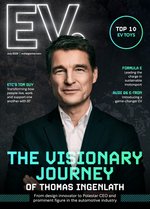Justin Herman: Leading Innovation at Panasonic Energy North

The transition to electric vehicles (EVs) represents a pivotal shift in the automotive industry. It promises to dramatically reduce carbon emissions and reshape our approach to transportation.
However, while the benefits of this transition are clear, the path to widespread EV adoption is fraught with significant hurdles that extend beyond just vehicle production.
These initiatives are crucial in combating what is commonly referred to as 'range anxiety' – a significant barrier to EV adoption.
At the heart of this revolution lies a critical component: the lithium-ion battery. As the world races to embrace cleaner mobility solutions, manufacturing high-performance, sustainable batteries has become central to enabling e-mobility and meeting global sustainability goals.
Lithium-ion batteries are the powerhouses behind EVs, providing the energy storage and delivery that make long-range, zero-emission vehicles possible. The quality, efficiency, and sustainability of these batteries directly impact EVs' performance, cost, and environmental footprint. As such, advancements in battery technology and production are key drivers in accelerating EV adoption and—by extension—in reducing greenhouse gas emissions from the transportation sector.
Driving innovation through AI and advanced technologies
To use an automotive cliche, battery manufacturers hold the key to EVs' success. An arm of Panasonic Group, Panasonic Energy focuses on developing, producing, and supplying high-performance lithium-ion batteries that power various applications, ranging from EVs to renewable energy storage solutions.
Panasonic Energy's competitive edge is based on its use of artificial intelligence (AI) and other advanced technologies. Justin Herman, Panasonic Energy's Vice President and Chief Information Officer, explains how the company harnesses these tools to revolutionise battery production.
"We see AI as a tool to empower and enable all our employees, from the executive team to operators on the frontline," Justin explains. "This reduces loss cost and waste and has a positive environmental impact, considering our Nevada factory is producing millions of cells per day." This human-centric approach to AI implementation has yielded impressive results. At Panasonic Energy's Gigafactory in Nevada, 22 different AI use cases span various departments, from winding areas and quality control to maintenance.
One striking example of AI's impact is in-process optimisation. Justin notes that AI has reduced the time spent on repetitive tasks like data collection from 4-5 hours to just 10-15 minutes, freeing up engineers for more value-added activities. Moreover, AI serves as a secondary judgement factor on production lines, helping to scan products and reduce waste by 10 to 15% in some cases. The Nevada factory produces millions of cells daily, so the reduction translates to significant cost savings and environmental benefits.
Integrating AI and machine learning has been instrumental in Panasonic Energy's remarkable growth. Since shipping its first cell in 2017, the company reached the milestone of one billion cells in 2019 and skyrocketed to nine billion cells in just five years. This exponential increase in production capability is a testament to the power of AI in improving operational efficiencies and supporting the global green energy transition.
Commitment to sustainability
Panasonic Energy's approach to powering global mobility extends beyond technological innovation to encompass a solid commitment to sustainability. The company's GREEN IMPACT initiative, which aims to reduce CO2 emissions across manufacturing, operations, and end-user consumption, exemplifies this dedication. "At every level, we are committed to producing sustainable technologies that create a healthier planet where we can all thrive," Justin explains.
A key component of Panasonic's sustainability efforts is its partnership with Redwood Materials. The collaboration will provide recycled cathode materials and copper foil for EV batteries, which will be used in production at Panasonic Energy's new factory in Kansas starting in 2025 and at the existing Nevada facility. JB Straubel, CEO of Redwood Materials, notes that the circular economy approach reduces the environmental impact of battery production and helps secure a more sustainable and resilient supply chain. "Our mission at Redwood Materials is to create a circular supply chain for batteries, reducing waste and environmental impact," affirms JB.
Panasonic Energy is taking significant steps to decarbonise its operations. The company plans to power its new factory in Kansas with 100% renewable energy, setting a new standard for sustainable manufacturing in the EV battery industry.
Expanding production and partnerships
As demand for EVs continues to surge, Panasonic Energy is strategically expanding its production capabilities and forging key partnerships to meet the growing need for high-quality lithium-ion batteries.
The company's new EV battery manufacturing facility in De Soto, Kansas, set to open in early 2025, represents a significant expansion of Panasonic Energy's production capacity in North America. Redwood will provide recycled copper foil for the batteries produced. " We're focusing on the entire lifecycle of the battery, from manufacturing to recycling, to ensure sustainability," adds JB.
Justin explains that the company is leveraging AI applications in finance and construction management to ensure the facility meets its 2025 start-of-production target. By applying lessons learned and processes developed at the Nevada Gigafactory, Panasonic Energy aims to hit the ground running in Kansas, scaling existing Gen AI models while introducing new use cases.
On the partnership front, Panasonic Energy has been busy securing agreements that will strengthen its position in the EV market. Recent supply agreements with major automakers like Mazda Motor Corporation and Subaru Corporation for cylindrical automotive lithium-ion batteries highlight the company's growing influence in the industry.
Additionally, Panasonic Energy has been reinforcing its supply chain with partnerships that align with its sustainability goals. Agreements with NOVONIX Limited for synthetic graphite and Nouveau Monde Graphite Inc. for natural graphite demonstrate the company's commitment to responsibly sourcing materials and reducing its battery production's carbon footprint.
The human element in technological advancement
Despite emphasising AI and advanced technologies, Panasonic Energy strongly focuses on the human element in its operations. Herman stresses the importance of a human-centric approach to AI implementation, viewing it as an enabler rather than a replacement for human expertise.
"While it is important to utilise technology, it is more important to ensure that technologies like generative AI are applied thoughtfully to elevate individuals within the organisation, making their jobs more fulfilling and impactful," Justin concludes.
**************
Make sure you check out the latest edition of EV Magazine and also sign up to our global conference series - Sustainability LIVE 2024
**************
EV Magazine is a BizClik brand


